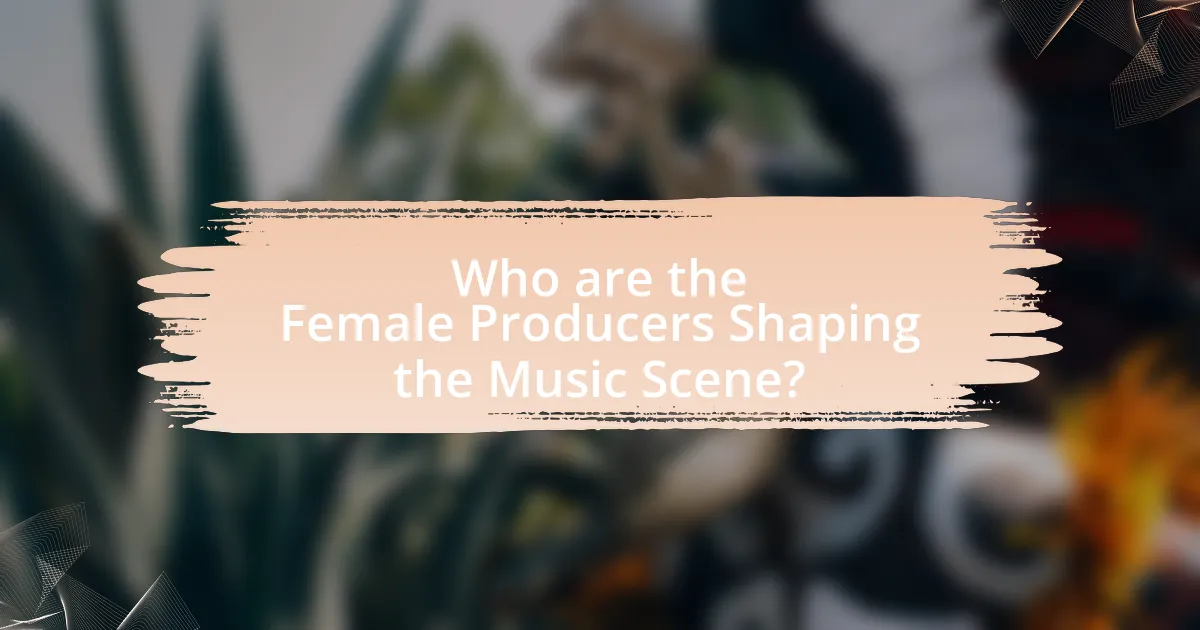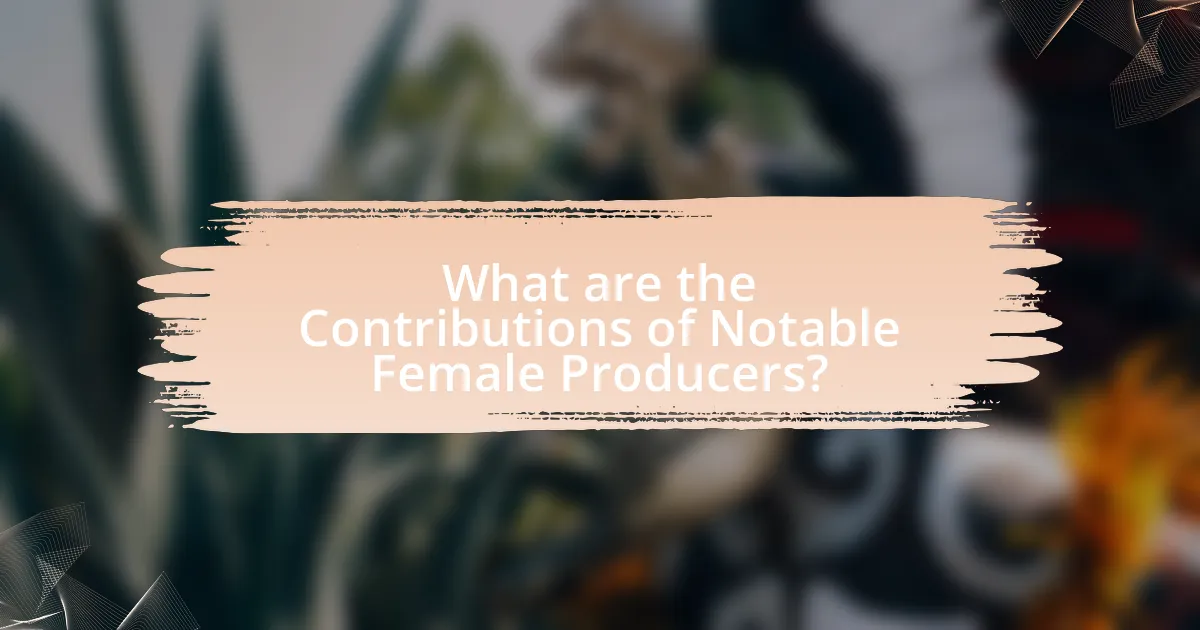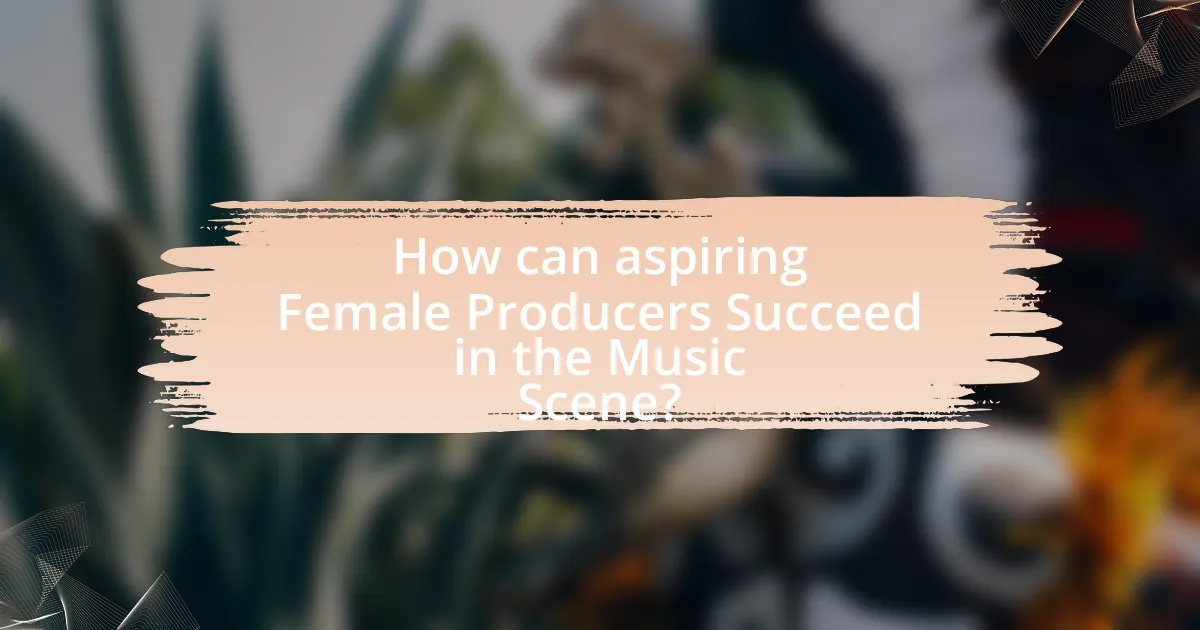The article focuses on female producers who are significantly influencing the music scene, highlighting key figures such as Linda Perry, Imogen Heap, and Sylvia Massey. It explores the essential roles these producers play in songwriting, arranging, and engineering, as well as their impact on various music genres through innovative techniques and diverse perspectives. The article also addresses the challenges female producers face, the importance of representation, and the resources available to support aspiring women in the industry. Additionally, it discusses recent trends, collaborations, and the future prospects for female producers, emphasizing their critical role in shaping contemporary music.

Who are the Female Producers Shaping the Music Scene?
Female producers shaping the music scene include notable figures such as Linda Perry, who has produced hits for artists like Pink and Christina Aguilera, and Imogen Heap, known for her innovative use of technology in music production. Other influential producers are Sylvia Massey, recognized for her work with Tool and System of a Down, and Tinashe, who has made significant contributions to her own music as well as for other artists. These producers have not only created chart-topping tracks but have also paved the way for future generations of women in the industry, demonstrating their impact through both commercial success and artistic innovation.
What roles do female producers play in the music industry?
Female producers play crucial roles in the music industry, including songwriting, arranging, engineering, and overseeing the production process. They contribute to the creative direction of projects, often bringing unique perspectives that enhance the artistic quality of music. For instance, notable female producers like Linda Perry and Imogen Heap have significantly influenced various genres, demonstrating their ability to shape sound and style. Statistics show that while women represent a minority in production roles, their impact is profound, as evidenced by Grammy nominations and wins for female-produced albums, highlighting their essential contributions to the industry.
How do female producers influence music genres?
Female producers influence music genres by introducing diverse perspectives and innovative techniques that reshape sound and production styles. For instance, producers like Linda Perry and Imogen Heap have significantly impacted pop and electronic music through their unique approaches to songwriting and sound design. Their contributions often challenge traditional norms, leading to the emergence of new sub-genres and styles, such as the blending of electronic elements with acoustic sounds. Additionally, research indicates that female producers often prioritize collaboration and inclusivity, fostering environments that encourage creativity and experimentation, which can lead to groundbreaking music that resonates across various demographics.
What unique perspectives do female producers bring to their work?
Female producers bring diverse perspectives to their work, often emphasizing collaboration, emotional depth, and inclusivity. Their experiences as women in a predominantly male industry allow them to approach music production with a unique sensitivity to themes of empowerment and representation. Research indicates that female producers are more likely to prioritize the emotional narratives within their projects, fostering a more holistic and relatable sound. For instance, a study by the USC Annenberg Inclusion Initiative found that female producers contribute to a broader range of musical styles and narratives, enhancing the richness of the music scene. This distinct viewpoint not only influences the creative process but also helps to challenge industry norms and promote gender equality in music production.
Why is it important to highlight female producers?
Highlighting female producers is important because it promotes gender equality and representation in the music industry. Female producers have historically been underrepresented, making up only about 2% of producers in popular music as of 2020, according to a study by the USC Annenberg Inclusion Initiative. By showcasing their contributions, the industry can challenge stereotypes, inspire future generations, and create a more inclusive environment that values diverse perspectives and creativity. This recognition can lead to increased opportunities for women in production roles, ultimately enriching the music scene as a whole.
What challenges do female producers face in the industry?
Female producers face significant challenges in the industry, including gender bias, lack of representation, and limited access to resources. Gender bias manifests in the form of stereotypes that question women’s technical abilities and leadership skills, often leading to fewer opportunities for female producers compared to their male counterparts. According to a 2021 report by the Annenberg Inclusion Initiative, only 2.6% of producers across popular music are women, highlighting the stark underrepresentation. Additionally, female producers often encounter difficulties in networking and mentorship, which are crucial for career advancement, as many industry events and spaces remain male-dominated. These challenges collectively hinder the progress and recognition of female producers in the music scene.
How does representation of female producers impact the music scene?
The representation of female producers significantly enhances the diversity and creativity within the music scene. Female producers bring unique perspectives and experiences that influence the sound and direction of music, leading to innovative genres and styles. For instance, studies show that songs produced by women often incorporate different emotional narratives and production techniques compared to their male counterparts, which can attract a broader audience. Furthermore, increased visibility of female producers challenges gender stereotypes in the industry, encouraging more women to pursue careers in music production. This shift is evidenced by the rise of successful female producers like Linda Perry and Imogen Heap, who have not only achieved commercial success but also inspired a new generation of female talent in the music industry.

What are the Contributions of Notable Female Producers?
Notable female producers have significantly shaped the music scene by breaking gender barriers, influencing sound, and driving innovation in various genres. For instance, Sylvia Robinson, known as the “Mother of Hip-Hop,” co-produced the groundbreaking track “Rapper’s Delight,” which helped launch the hip-hop genre into mainstream culture. Additionally, Linda Perry, a prominent figure in rock and pop, produced hits for artists like Christina Aguilera and Pink, showcasing her ability to blend commercial success with artistic integrity. Furthermore, producers like Imogen Heap and Grimes have pushed the boundaries of electronic music, integrating technology and personal expression in their work. These contributions not only highlight the creative talents of female producers but also their essential role in diversifying and enriching the music industry.
Who are some influential female producers in music history?
Some influential female producers in music history include Sylvia Robinson, who co-founded Sugar Hill Records and produced “Rapper’s Delight,” the first commercially successful hip-hop single. Another notable figure is Linda Perry, known for producing hits for artists like Christina Aguilera and Pink, significantly shaping pop music in the late 1990s and early 2000s. Additionally, Missy Elliott has made a profound impact as a producer and artist, known for her innovative sound and production techniques in hip-hop and R&B. These women have not only produced chart-topping hits but have also paved the way for future generations of female producers in the music industry.
What are the signature styles of these notable producers?
Notable female producers exhibit diverse signature styles that significantly influence the music scene. For instance, Linda Perry is known for her emotive songwriting and rock-infused pop production, which has shaped hits for artists like Pink and Christina Aguilera. Similarly, Imogen Heap incorporates innovative technology and sound design, blending electronic elements with organic instrumentation, as evidenced in her work on “Hide and Seek.” Additionally, Timbaland’s protégé, Missy Elliott, showcases a unique fusion of hip-hop and R&B, characterized by her rhythmic vocal delivery and experimental beats, which can be heard in tracks like “Get Ur Freak On.” These producers not only define their genres but also pave the way for future artists through their distinctive approaches.
How have these producers changed the landscape of music?
Female producers have significantly transformed the landscape of music by breaking gender barriers and introducing diverse perspectives in sound and production techniques. Historically, the music industry has been male-dominated, but female producers like Linda Perry, Missy Elliott, and Imogen Heap have not only achieved commercial success but also influenced the creative direction of various genres. For instance, Linda Perry’s work with artists such as Pink and Christina Aguilera has shaped pop music’s evolution in the late 1990s and early 2000s, while Missy Elliott’s innovative blending of hip-hop and R&B has redefined those genres. Furthermore, the rise of platforms like SoundCloud and social media has empowered female producers to showcase their work independently, leading to increased visibility and opportunities. This shift has resulted in a more inclusive music industry, fostering creativity and collaboration across gender lines.
What recent trends are emerging among female producers?
Recent trends among female producers include an increase in collaboration across genres and a focus on social issues within their work. Female producers are increasingly partnering with artists from diverse backgrounds, which fosters innovation and expands musical boundaries. Additionally, many are using their platforms to address topics such as gender equality, mental health, and social justice, reflecting a broader cultural shift towards activism in the music industry. This trend is supported by data showing that female producers are gaining recognition in major music awards, indicating their growing influence and visibility in the industry.
How are technology and social media affecting female producers?
Technology and social media are empowering female producers by providing them with accessible tools and platforms to showcase their work. The rise of digital audio workstations and affordable production software has lowered barriers to entry, enabling more women to enter the music production field. Additionally, social media platforms like Instagram and TikTok allow female producers to share their music, connect with audiences, and build personal brands, which can lead to increased visibility and opportunities in a traditionally male-dominated industry. According to a 2021 report by the Annenberg Inclusion Initiative, women made up only 2.6% of producers across the top 100 songs, highlighting the ongoing challenges, but the growing presence of female producers on social media indicates a shift towards greater representation and recognition.
What collaborations are currently making waves in the industry?
Current collaborations making waves in the music industry include the partnership between Dua Lipa and Elton John on the remix of “Cold Heart,” which has gained significant chart success and streaming numbers. Additionally, the collaboration between Billie Eilish and her brother Finneas has consistently produced critically acclaimed music, showcasing their unique sound and songwriting prowess. These collaborations highlight the influence of established and emerging artists in shaping contemporary music trends.

How can aspiring Female Producers Succeed in the Music Scene?
Aspiring female producers can succeed in the music scene by building a strong network, honing their technical skills, and creating a unique sound. Networking is crucial as it opens doors to collaborations and opportunities; for instance, women in music have reported that 70% of their career advancements came from connections made within the industry. Technical skills can be developed through formal education or online courses, with platforms like Berklee Online offering specialized programs in music production. Additionally, creating a distinctive sound helps female producers stand out in a competitive market; artists like Grimes and Billie Eilish have successfully carved their niches by blending genres and experimenting with production techniques.
What skills are essential for female producers to develop?
Essential skills for female producers to develop include technical proficiency in music production software, strong communication abilities, and a solid understanding of music theory. Technical proficiency allows producers to effectively use tools like Pro Tools or Ableton Live, which are crucial for creating and editing music. Strong communication skills facilitate collaboration with artists, engineers, and other stakeholders, ensuring that creative visions are clearly articulated and executed. A solid understanding of music theory enhances a producer’s ability to create compelling compositions and arrangements. These skills are vital for navigating the competitive music industry, where expertise and collaboration are key to success.
How can networking benefit female producers in their careers?
Networking can significantly benefit female producers in their careers by providing access to opportunities, resources, and mentorship that may otherwise be limited. Through networking, female producers can connect with industry professionals, gain insights into industry trends, and collaborate on projects, which enhances their visibility and credibility in a male-dominated field. Research indicates that women in music production who actively network are more likely to secure funding and support for their projects, as well as receive invitations to industry events and panels, which can lead to further career advancement. For instance, a study by the USC Annenberg Inclusion Initiative found that women who networked effectively were 50% more likely to be recognized for their work compared to those who did not engage in networking activities.
What resources are available for aspiring female producers?
Aspiring female producers can access various resources to enhance their skills and network within the industry. Organizations such as Women in Music provide mentorship programs, networking events, and educational workshops specifically designed for women in the music industry. Additionally, the She Is The Music initiative focuses on increasing the representation of women in music production through resources like grants and educational opportunities. Furthermore, online platforms like SoundOnSound and YouTube offer tutorials and courses tailored to music production, which can be beneficial for skill development. These resources collectively support aspiring female producers in navigating and succeeding in the music scene.
What best practices should female producers follow?
Female producers should prioritize networking, skill development, and advocating for their work. Networking allows female producers to build relationships within the industry, which can lead to collaboration opportunities and mentorship. Skill development is essential; mastering technical skills and staying updated with industry trends enhances their credibility and marketability. Advocating for their work ensures that female producers receive recognition and fair compensation, addressing the gender disparities prevalent in the music industry. According to a 2021 report by the Annenberg Inclusion Initiative, only 2.6% of producers across popular music are women, highlighting the need for these best practices to increase representation and success.
How can female producers effectively market their work?
Female producers can effectively market their work by leveraging social media platforms to build a personal brand and connect with their audience. Utilizing platforms like Instagram, TikTok, and Twitter allows them to showcase their music, share behind-the-scenes content, and engage with fans directly. According to a 2021 report by the International Music Summit, 70% of music consumers discover new artists through social media, highlighting its importance in marketing strategies. Additionally, collaborating with other artists and producers can expand their reach and introduce their work to new audiences, further enhancing visibility in a competitive industry.
What strategies can help female producers overcome industry barriers?
Female producers can overcome industry barriers by leveraging networking opportunities, seeking mentorship, and advocating for diversity initiatives. Networking allows female producers to connect with industry professionals, share experiences, and gain visibility, which is crucial in a male-dominated field. Mentorship provides guidance and support from experienced individuals, helping to navigate challenges and build confidence. Additionally, advocating for diversity initiatives can lead to more inclusive practices within the industry, as evidenced by organizations like Women in Music, which promote gender equality and support female talent. These strategies collectively empower female producers to break through barriers and succeed in the music scene.
What are the future prospects for female producers in the music industry?
The future prospects for female producers in the music industry are increasingly positive, driven by a growing recognition of their contributions and a push for gender equality. Industry initiatives, such as the 2020 report from the Annenberg Inclusion Initiative, highlight that female producers are gaining visibility, with a notable increase in their representation in major music projects. Additionally, organizations like Women in Music and She Is The Music are actively supporting female talent through mentorship programs and networking opportunities, further enhancing their prospects. As the industry continues to evolve, the demand for diverse voices and perspectives is likely to create more opportunities for female producers, solidifying their role in shaping the future of music.
How can the industry continue to support female producers?
The industry can continue to support female producers by implementing mentorship programs that connect emerging female talent with established professionals. These programs have been shown to enhance career development and provide valuable networking opportunities, as evidenced by initiatives like the Women in Music mentorship program, which has successfully paired over 100 women in various roles within the music industry. Additionally, increasing funding and resources for female-led projects can help bridge the gender gap in production roles, as research indicates that female producers often face barriers in accessing financial support compared to their male counterparts. By prioritizing these strategies, the industry can create a more inclusive environment that fosters the growth and success of female producers.
What role will female producers play in shaping future music trends?
Female producers will play a crucial role in shaping future music trends by introducing diverse perspectives and innovative sounds. Their influence is evident in the growing number of successful female producers, such as Linda Perry and Imogen Heap, who have pioneered new genres and production techniques. Research indicates that music produced by women often incorporates unique emotional narratives and experimental styles, which resonate with broader audiences. This shift not only diversifies the music landscape but also challenges traditional industry norms, leading to a more inclusive and representative music scene.